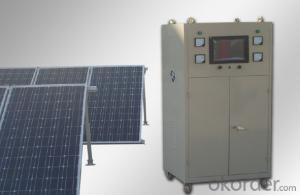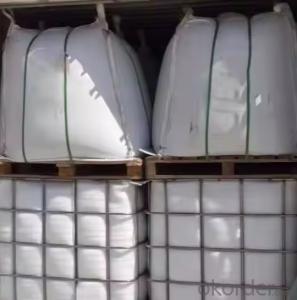Solar Home System CNBM-K8 5KW from CNBM
- Loading Port:
- China main port
- Payment Terms:
- TT OR LC
- Min Order Qty:
- 1 watt
- Supply Capability:
- 100000000 watt/month
OKorder Service Pledge
OKorder Financial Service
You Might Also Like
Item specifice
Description:
CNBM Solar is a world-leading and Vertical integrated manufacturer ofhigh-performance with Silicon,
Wafer, Cells, Modules, which convertsunlight into electricity for residential, commercial, and utility-scale
power generation.
The capacity of CNBMSolar is reach to 1GW, andmake sure each year our shipment capacity is more
Than 700-800MWs, at the same time, wehave set up the largest solar power station with our partner
in Ukraine.
CNBM is a Quality + Service orientedcompany with“Excellence at Each Step” approach, composed of
the finest components from TUV andIEC-certified partners around the world, CNBM modules consistently
undergo a variety of trials at thecompany’s Test & Development Centre, ensuring peak performance
capabilities. The company iscommitted to develop and provide the world with clean and renewable energy
to ease the energy shortages as wellas human kind’s impact on the environment.
Data:
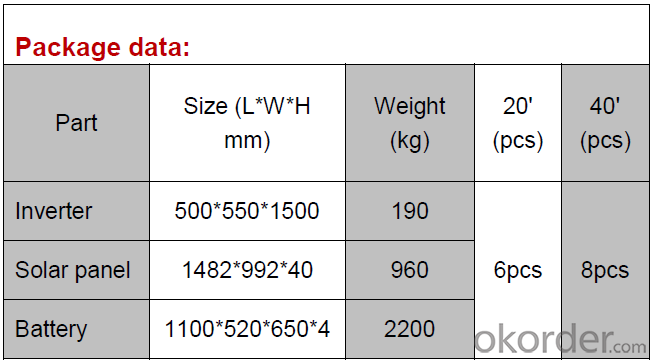
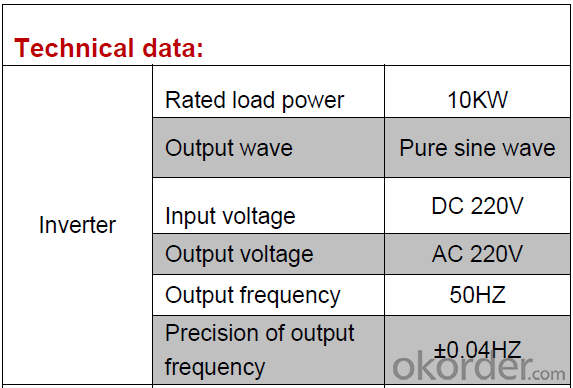
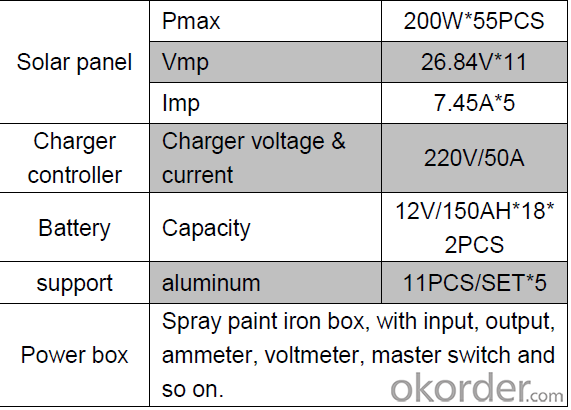
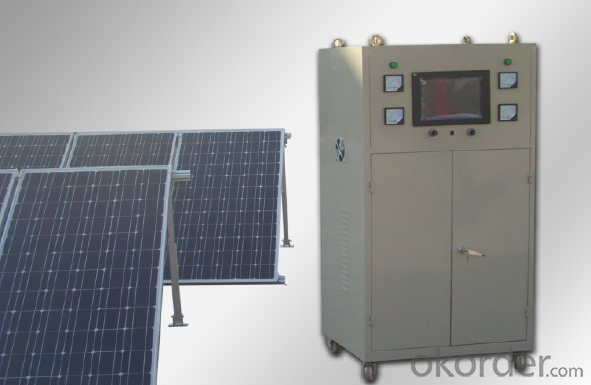
FAQ:How long can we receive the product after purchase?
In the purchase of product within three working days, We will arrange the factory delivery as soon as possible. The pecific time of receiving is related to the state and position of customers.Commonly 7 to 10 working days can be served.
- Q:Can solar energy systems be installed in areas with extreme temperatures?
- Yes, solar energy systems can be installed in areas with extreme temperatures. Solar panels are designed to withstand a wide range of temperatures, including both hot and cold climates. However, extreme temperatures can affect the efficiency and performance of the system, so proper design and insulation measures should be taken into consideration during installation to ensure optimal performance and longevity.
- Q:How do solar energy systems impact the quality of air and water?
- The quality of air and water is positively affected by solar energy systems. Unlike coal or gas, which are traditional energy sources, solar energy does not release harmful emissions or pollutants, resulting in a significant decrease in air pollution. This not only enhances air quality but also aids in reducing the greenhouse gas emissions that contribute to climate change. Solar energy systems also have a minimal impact on water quality. Although some water is utilized during the manufacturing process of solar panels, the quantity used is considerably lower compared to other energy sources like fossil fuels. Furthermore, solar energy does not require water for its operation, unlike thermal power plants that consume large amounts of water for cooling purposes. Additionally, the use of solar energy diminishes reliance on fossil fuels, which are often obtained through environmentally destructive methods such as fracking or oil spills. Shifting to solar energy significantly reduces the risk of water contamination resulting from these activities. Moreover, solar energy systems contribute to the conservation of water resources. Traditional energy sources like coal or gas power plants necessitate substantial amounts of water for operation, which can strain local water supplies and ecosystems. On the other hand, solar energy generation does not require water, thus aiding in the conservation of water resources and alleviating stress on aquatic ecosystems. In conclusion, solar energy systems have a positive impact on both air and water quality. They aid in reducing air pollution, greenhouse gas emissions, and the risk of water contamination, while also conserving water resources. By embracing solar energy, we can advocate for a cleaner and healthier environment for future generations.
- Q:How do solar energy systems impact energy efficiency measures?
- Solar energy systems can greatly improve energy efficiency measures. By harnessing the power of the sun, solar energy systems provide clean and renewable energy that reduces reliance on traditional fossil fuels. This helps to decrease overall energy consumption and greenhouse gas emissions. Additionally, solar energy systems can be integrated with energy efficiency measures such as insulation, LED lighting, and smart thermostats to further optimize energy usage and reduce costs. Overall, solar energy systems play a crucial role in enhancing energy efficiency and promoting a sustainable future.
- Q:Can solar energy systems be used in powering concert halls or auditoriums?
- Yes, solar energy systems can certainly be used to power concert halls or auditoriums. The use of solar energy in large venues like concert halls and auditoriums has become increasingly popular due to its numerous benefits. Solar panels can be installed on the roof or surrounding areas of the venue to capture sunlight and convert it into electricity. This renewable energy source can then be used to power all the electrical equipment and lighting systems within the concert hall or auditorium. One of the main advantages of using solar energy systems in these venues is the potential cost savings. Concert halls and auditoriums often consume large amounts of electricity, particularly during events and performances. By harnessing solar power, these venues can significantly reduce their dependence on the traditional power grid and lower their energy bills. Additionally, solar energy systems require minimal maintenance once installed, which further contributes to the long-term cost-effectiveness. Moreover, integrating solar energy into concert halls and auditoriums aligns with the growing global focus on sustainability and reducing carbon footprints. By utilizing renewable energy sources like solar power, these venues can significantly decrease their greenhouse gas emissions and promote a more environmentally friendly approach to energy consumption. This not only benefits the venue itself but also contributes to the overall sustainability goals of the local community and society as a whole. However, it is important to consider that the size and power requirements of concert halls and auditoriums may require a significant investment in solar panels and associated equipment. The venue's energy demand, the available space for installation, and the local climate are all factors that need to be assessed during the planning stage. It is crucial to ensure that the solar energy system is properly sized to meet the energy needs of the venue and that it is designed to withstand the specific weather conditions of the location. In conclusion, solar energy systems can indeed be used to power concert halls or auditoriums. The benefits of using solar power in these venues include cost savings, environmental sustainability, and reducing reliance on the traditional power grid. With careful planning and installation, solar energy can provide a reliable and efficient source of electricity to meet the energy demands of such large-scale venues.
- Q:Can solar energy systems be used in areas with limited access to backup systems?
- Yes, solar energy systems can be used in areas with limited access to backup systems. Solar energy systems, such as solar panels, can generate electricity during the day by harnessing the sun's energy. This electricity can be used directly to power devices or stored in batteries for later use, providing a reliable source of energy even in areas with limited access to backup systems or unreliable grid infrastructure. Additionally, advancements in solar technology have made off-grid solar systems more efficient and affordable, making them a viable option for powering remote areas or locations with limited or no access to traditional backup systems.
- Q:Are there any risks of electrical malfunction or failure with solar energy systems?
- Solar energy systems come with certain risks of electrical malfunction or failure. One of the primary concerns revolves around faulty or damaged electrical connections, which can cause a loss of power generation or even spark electrical fires. Moreover, extreme weather conditions like lightning strikes or strong winds have the potential to harm solar panels or inverters, resulting in either temporary or permanent system failure. Another issue lies in the gradual degradation of solar panels over time, leading to reduced efficiency and eventual replacement. Furthermore, inadequate installation or maintenance practices may contribute to system failure or electrical malfunctions. To mitigate these risks, it is crucial to have solar energy systems installed by qualified professionals and ensure regular inspections and maintenance are conducted.
- Q:Can solar energy systems be installed on industrial facilities?
- Yes, solar energy systems can be installed on industrial facilities. In fact, many industrial facilities have already adopted solar energy as a viable and sustainable source of power. These systems can significantly reduce energy costs, decrease reliance on fossil fuels, and contribute to a greener and more sustainable future for industrial operations.
- Q:Can solar energy systems be used in areas with limited sunlight?
- Yes, solar energy systems can still be used in areas with limited sunlight. While areas with abundant sunlight are ideal for solar energy generation, advancements in solar technology have made it possible to generate electricity even in areas with less sunlight. These systems can still produce a significant amount of energy by capturing and converting sunlight, albeit at a reduced efficiency. Additionally, energy storage solutions such as batteries can help store excess energy for use during periods of low sunlight.
- Q:Can a solar energy system be used to heat water?
- Yes, a solar energy system can be used to heat water. Solar water heaters use the sun's energy to heat water for various applications such as domestic use, swimming pools, and industrial processes. These systems typically consist of solar collectors that absorb the sun's radiation and transfer the heat to a fluid, which is then circulated to heat water stored in a tank. Solar water heaters are efficient, cost-effective, and environmentally friendly alternatives to traditional water heating methods. They can significantly reduce energy bills and greenhouse gas emissions while providing hot water throughout the year.
- Q:Can solar energy systems be used for powering RVs?
- Yes, solar energy systems can be used to power RVs. Solar panels can be installed on the roof of the RV to capture sunlight and convert it into electricity. This renewable energy source can then be used to power various appliances and systems within the RV, such as lights, refrigerator, water heater, and more. The availability of solar power allows RV owners to reduce their reliance on traditional fuel-powered generators and enjoy a more sustainable and cost-effective energy solution.
1. Manufacturer Overview |
|
|---|---|
| Location | |
| Year Established | |
| Annual Output Value | |
| Main Markets | |
| Company Certifications | |
2. Manufacturer Certificates |
|
|---|---|
| a) Certification Name | |
| Range | |
| Reference | |
| Validity Period | |
3. Manufacturer Capability |
|
|---|---|
| a)Trade Capacity | |
| Nearest Port | |
| Export Percentage | |
| No.of Employees in Trade Department | |
| Language Spoken: | |
| b)Factory Information | |
| Factory Size: | |
| No. of Production Lines | |
| Contract Manufacturing | |
| Product Price Range | |
Send your message to us
Solar Home System CNBM-K8 5KW from CNBM
- Loading Port:
- China main port
- Payment Terms:
- TT OR LC
- Min Order Qty:
- 1 watt
- Supply Capability:
- 100000000 watt/month
OKorder Service Pledge
OKorder Financial Service
Similar products
New products
Hot products
Hot Searches
Related keywords
